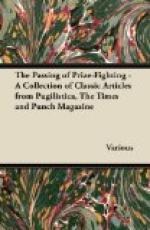In view of the theory developed by the Ministry of Reconstruction’s Sub-Committee on Organisation and Conditions of Domestic Service, that “the attitude adopted by the Press and the Stage is usually an unfortunate one, as servants are frequently represented as comic or flippant characters, and are held up to ridicule,” a meeting of our leading dramatists was hastily convened last evening by Lady HEADFORT (who, it will be remembered, is all for calling her maids “Home-birds”) to engage their sympathetic co-operation in aid of mistresses, housekeepers and employers generally. What the stage has taken away the stage must give back: that is Lady HEADFORT’S contention. Not that the domestic problem will even then be settled; there will probably still be difficulty in persuading W.A.A.C.s and Land Women and Munitioners who have tasted blood to descend below stairs again; but perhaps a little help will be forthcoming. Hence this influential gathering.
Sir SQUIRE BANCROFT, who presided, said that the domestic problem was one of great seriousness. Personally he rarely descended to the servants’ hall, but he did not pretend to be unaware of the usefulness of such regions and of our dependence upon them. There must be give and take. If the stage had been guilty of too much levity in its portraiture of domestic servants, then, in the interests of all of us, it must make what our lively neighbours call the amende honorable.
Sir JAMES BARRIE said that no one could hold him personally to blame. His plays had always exhibited domestic servants in a most favourable light. Not only was a butler the hero of The Admirable Crichton, a maidservant the heroine of A Kiss for Cinderella and a charwoman the heroine of The Old Lady Shows Her Medals, but the actual authorship of Peter Pan was given to the smallest nursemaid on record.
Mr. SOMERSET MAUGHAM also claimed to be on the side of the home-birds. Had he not in Smith written a part of strong parlour-maid interest for Miss MARIE LOeHR?
Mr. G.B. SHAW said that there was no need for the meeting at all, because he was just putting the finishing touches to a witty drama which would settle the whole question. In this play, which, he could tell them on the best authority in the world, his own, was a work of surpassing genius, the Irish Question, which had baffled statesmen and philosophers for centuries, is settled once and for all by the wisdom and presence of mind of a Kerry kitchenmaid.
The Chairman said that perhaps the meeting might as well proceed with its discussion, since there was always the possibility that the run of Mr. SHAW’S play might not equal that of his last, which, he understood, had just been produced in New York and had come off almost at once.




